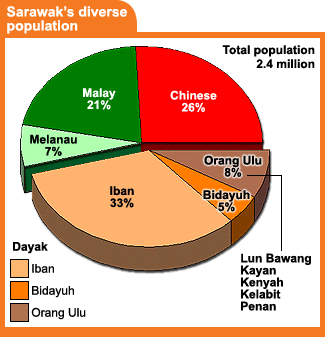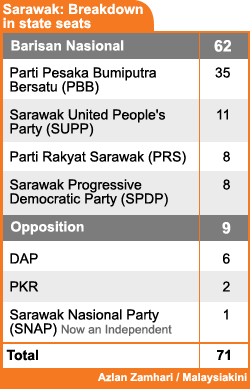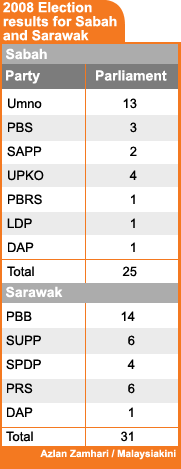PKR top leadership has re-organised its Sarawak leadership to strengthen the opposition party ahead of the state elections due in the next two years.
One of the key changes is the appointment of specific leaders responsible for getting support from the various major ethnic groups in the state.
Party’s de facto leader and parliamentary opposition leader Anwar Ibrahim remains the state chief after taking over from Padungan state assemblyperson Dominique Ng earlier this year.
 A well-known native land rights activist and lawyer Baru Bian has been put in charge of the Orang Ulu (which include Kayan, Kenyah, Kelabit and Lun Bawang) section.
A well-known native land rights activist and lawyer Baru Bian has been put in charge of the Orang Ulu (which include Kayan, Kenyah, Kelabit and Lun Bawang) section.
Baru, a Lun Bawang from Lawas, was a member of the now defunct Parti Bansa Dayak Sarawak (PBDS).
He stood unsuccessfully on an Independent ticket in the last state elections three years ago for the Be'kelalan seat in northern Sarawak, and was accompanied by a number of well-known Orang Ulu lawyers in joining PKR.
There are three predominantly Orang Ulu state seats - Belaga, Ba'kelalan and Telang Usan.
According to reliable sources close to the top party leadership in Kuala Lumpur, a Bidayuh professional and former journalist Granda Aing has been tapped to head the Bidayuh section. There are six Bidayuh-majority seats.
Meanwhile, state assemblyperson for Ngemah, Gabriel Adit, has been put in charge of the Iban section, the largest Dayak group in Sarawak.
 There are about 20 predominantly Iban and Iban-majority state seats out of the total of 71 seats in the state assembly.
There are about 20 predominantly Iban and Iban-majority state seats out of the total of 71 seats in the state assembly.
In the absence of a strong local Malay leader, it is understood that Anwar himself will directly take charge of the Malay section, with advice from several local leaders, including party advisor and former state minister Hafsah Harun.
PKR insiders also said Anwar had asked Ng, who heads of party's Kuching division, to head the Chinese section but it is understood he has declined to do so.
Ng, who is said to be unhappy for being overlooked in the recent party reshuffle, has resigned from his supreme council seat.
The party is eyeing several Chinese-majority state seats, including Batu Kawah, Padungan - which it presently holds - and one or two seats in Miri.
However, another Pakatan Rakyat member, DAP, has also indicated its interest in fielding candidates in all Chinese-majority seats, including Padungan.
Parliamentary seats crucial for Pakatan
After the party's dismal performance in the Batang Ai by-election where there had been high hopes it would make the first breakthrough in the predominantly Iban seat, it is learnt that top party leaders are now re-strategising its poll strategy.
The opposition party is apparently will be giving greater priority to winning as many parliamentary seats in the next elections. Sarawak holds state and parliamentary elections separately.
 If no decision is made to hold both elections simultaneously, it means the state elections will come first, possibly as early as 2010, or at the latest 2011.
If no decision is made to hold both elections simultaneously, it means the state elections will come first, possibly as early as 2010, or at the latest 2011.
DAP presently holds one of the seven Chinese-majority parliamentary seats, with the rest held by state BN component Sarawak United People's Party (Supp).
It lost narrowly in several seats in the last parliamentary elections in March last year.
Malaysiakini understands that DAP is insisting it be given the right to field candidates in all Chinese-majority seats as it claims to have a better chance of winning. However, some PKR Chinese leaders are disputing this.
It is crucial for the opposition parties to win a sizable number of parliamentary seats in both Sarawak and Sabah if Pakatan Rakyat is to take over the federal government in the next general election.
“True, Batang Ai was a by-election and the BN was able to be very focused (in its campaigning). The rural electorate still take a lot of convincing to vote for the opposition, and it is difficult to tell whether things will change in the next general elections,” said a party leader.
Re-strategising and concentrating on parliamentary elections may be a quicker way for Pakatan to achieve its objective to take power, he added.

